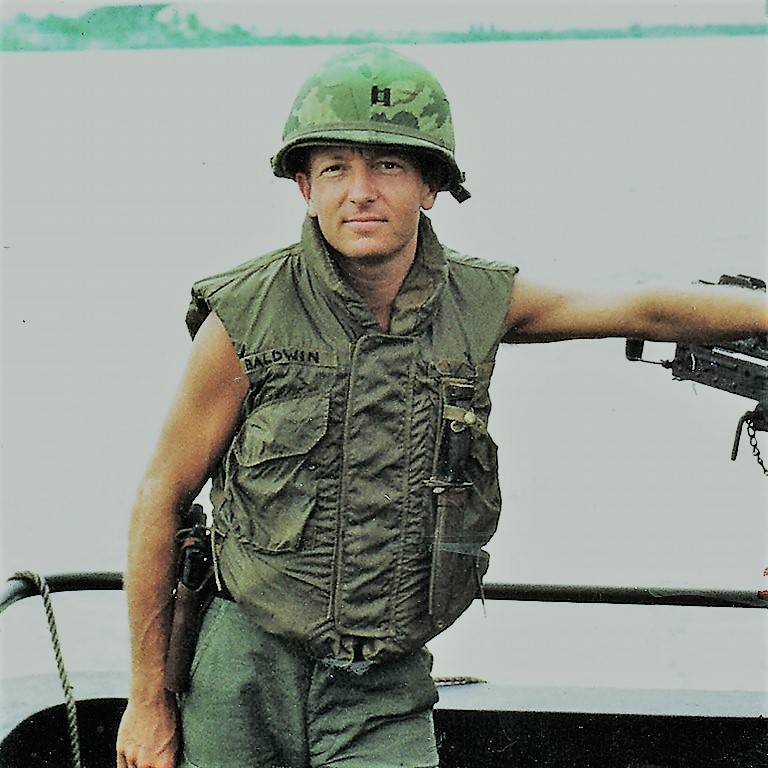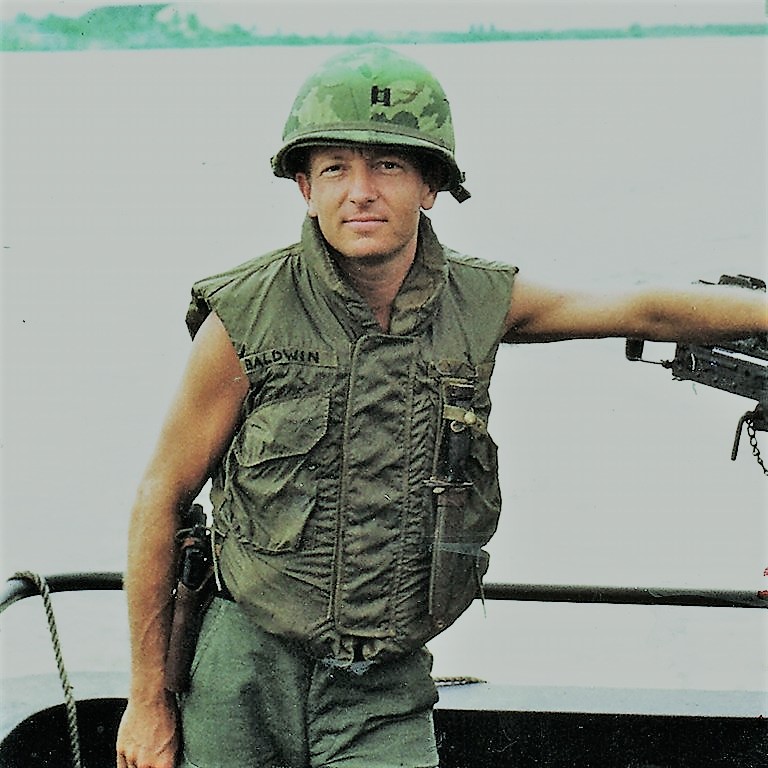Considering the skill and dedication of thousands of doctors, nurses and emergency workers battling a virus that continues to expand throughout the world, this story is yet another remarkable example such individuals perform every day. It’s a story worth reading.

U.S. Army Major John N. Baldwin (Ret.) was one example of someone who has contributed to my life.
As a retired vascular surgeon, I would often ask John for his expertise on a variety of medical issues, and when a serious issue of my own developed, he personally checked the background of a surgeon and gave the okay. When I sent him the after-surgery test results, he contacted colleagues at a San Francisco hospital who confirmed the positive prognosis of my surgeon.
I want to share one incredible moment from Baldwin’s life that reveals his dedication, skill and character as a young surgical intern.
Writing in One Patient at a Time – A Medical Center at Work, author Milton Zisowitz documents a day in the life of a… “young intern, only three months out of medical school, whose courage and split-second thinking saved the life of a fifty-year-old lawyer in an emergency operation…”
“Even in a hospital,” Zisowitz writes, “… a human life sometimes depends upon another human being. That human being… must have the background, the tradition, and the character to do [what is necessary in an emergency] – he must be a true physician. …
“Mr. Louis Sokol, a fifty-year-old lawyer, visited his family doctor complaining of vague pains in the chest. Since the diagnostic problem turned out to be somewhat difficult, he was referred to Dr. Eli Stonehill… Physical examination including an electrocardiogram failed to reveal any heart disease, but the history and symptoms indicated the possibility of coronary insufficiency, or impaired flow of blood to the heart muscle, and the patient was urged to enter the hospital immediately for a complete check-up. …
“For two days Dr. Stonehill observed his patient carefully and studied the many tests that were performed on him. Nothing seemed to be wrong, and since Mr. Sokol was altogether comfortable and the pains had disappeared, the physician planned to discharge him in a day or two…
“At 5:15 on Wednesday morning,” Zisowitz details, “the bell at the nurse’s station rang and the light showed that the call came from Room 308. No more than a minute elapsed before the nurse on night duty came to the lawyer’s assistance. Mr. Sokol was having a little pain and a mild coughing seizure, and she assured him that a doctor would see him as soon as possible. As she adjusted the pillow to make the patient more comfortable, he gasped deeply and stertorously, became pale and suddenly stopped breathing. The nurse lifted the bedside telephone to ask for help, but just then an intern assigned to the floor happened to look through the open door…
“ ‘Get the cardiac tray,’ ordered the doctor as he tore open the patient’s pajamas and applied his stethoscope to the motionless chest.
“In the less than thirty seconds it took for the nurse to return with the sterile equipment… the physician, out of medical school only three months, had made his decision. He could detect no pulse either at the wrist or in the neck; he could hear no heartbeat. There is not time for consultation when the heart stops. Three, or at most four, minutes without oxygen will permanently damage the brain and leave the patient a vegetable rather than a human being if, indeed, he survives at all.
“Seizing a scalpel from the tray, the intern felt for the space between the fourth and fifth ribs and, with one firm slash, opened the lawyer’s chest and exposed his heart. The gaping wound did not bleed, thus confirming the diagnosis of cardiac arrest and the urgency of immediate action. Thrusting his bare right hand into the opening, the physician grasped the heart and began alternately to compress and release the tough muscle at the rate of about seventy beats a minute.
“In the meantime, the nurse was forcing her own breath into Mr. Sokol’s lungs through a plastic tube she had inserted deep into his throat. Within minutes, other house officers summoned from their quarters arrived to help.
“[A] house surgeon… performed a tracheostomy, making a small incision directly into the windpipe. Through a tube in this hole, an assistant resident in anesthesiology began to administer oxygen from a machine while she attempted unsuccessfully to feel the pulse and measure the blood pressure. …
“Cardiac massage requires intense muscular concentration and considerable physical strength, and after ten minutes of incessant kneading, the intern was almost exhausted. The house surgeon took over without missing a beat, and between them, the two men maintained the vital intermittent compression for almost half an hour before the patient began to show the first signs of returning to life. But the medical resident shook her head as she watched the tape coming out of the electrocardiograph. The heart was beginning to respond, but it was fibrillating – beating weakly and haphazardly, barely pumping blood. They couldn’t stop.
“The anesthesiologist was still unable to detect either pulse or blood pressure. Drugs injected directly into its muscle fibers somewhat strengthened the heart’s action but did not correct the dangerous arrhythmia. An electric defibrillator was brought down from the operating room, and every few minutes the cardiac massage was momentarily interrupted so that minute shocks could be delivered in an attempt to restore normal rhythm.
“Dr. Stonehill burst into the room a little before six o’clock. A few questions and a hasty glance assured him that the house officers were doing everything possible for his patient. Resting from his stint, the assistant resident in surgery had joined his medical colleague at the electrocardiograph…
” ‘Send for blood,’ Dr. Stonehill ordered. ‘If he comes out of this, he’ll need plenty to bring up the pressure and pull him through the rest of what he faces. And we’d better have a supply of penicillin too. There’s bound to be some infection in that wound.’
“Then there was tense silence… Suddenly the anesthesiologist and the woman doctor glanced at each other in the same instant and whispered almost simultaneously, ‘I feel a pulse!’ ….
“ ‘Keeping pumping!’ cried Dr. Stonehill as he sprang to his feet and peered intently at the tape rolling out of the electrocardiograph. He studied the strip for well over a minute and then his eyes lighted up. ‘Normal sinus rhythm. Now he’s got a fighting chance.’
“The internist was now reasonably sure that his patient’s heart could take over for itself and he ordered the cardiac massage stopped. … Finally, Dr. Stonehill pulled his stethoscope away from his ears, folded it with deliberate movements, and tucked it into a hip pocket.
“ ‘Where is that young fellow?’ he asked, slowly looking around the room for the intern.
“There was no answer.
“ ‘I think I know,’ he said.
“He went downstairs and sat quietly at the rear of the chapel. When the intern raised his head and turned to leave, Dr. Stonehill held out his hand and said, ‘I’m proud of you. You were just a kid when I saw you enter medical college four years ago. Now, you’re a doctor. I often wonder – how does it happen?’ ”
The story was a powerful coda to Zisowitz’s book.
The name of this remarkable intern, just three months out of medical school, was left out of the book. I’d like to think that this was the writer’s intention – another anonymous everyman, much like police, fire, military, and neighbors we read about in news reports of similar heroic actions.
The doctor’s name was John N. Baldwin, who went on as chief of thoracic surgery in Vietnam. In a copy of this book he presented to me, John added these few remarks: “This book documents a day in my internship, which was in internal medicine; and the event, in the summer of 1959 which was God-given, was to take me into cardiac surgery the following year.
“The only discrepancy in the text,” John adds, “is the fact that I used my pocket Boy Scout knife, not a ‘cardiac tray.’ ”
Amazing!
Big Correction: I had originally stated that John Baldwin had passed. I spoke with him Monday afternoon. Although he is weak and has great difficulty speaking, I gave him my best wishes. Apologies for the misstatement; it has since been removed. However, his actions, described in the story remain inspiring.
Comments










